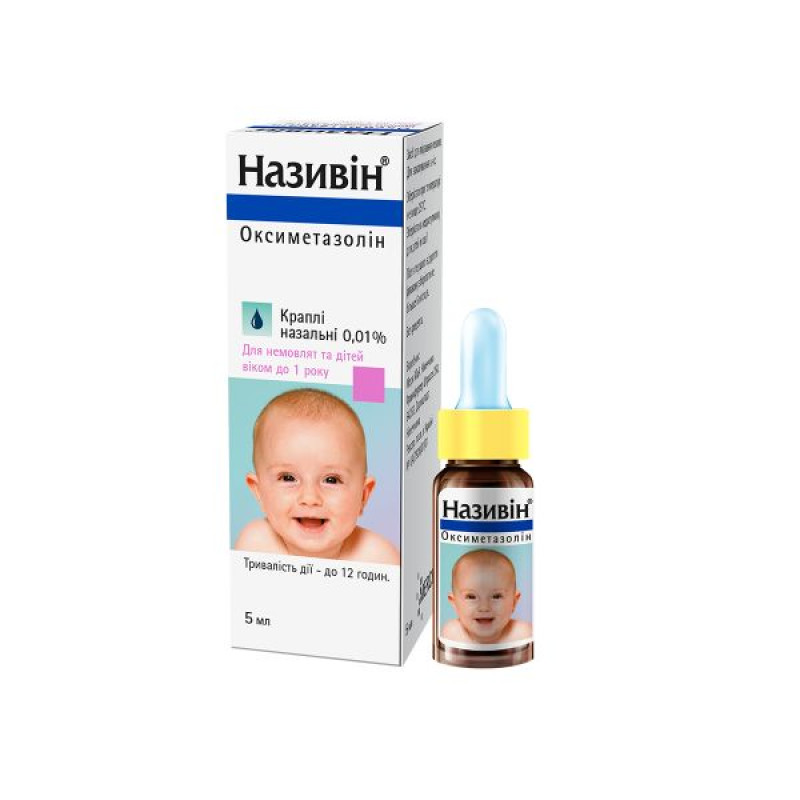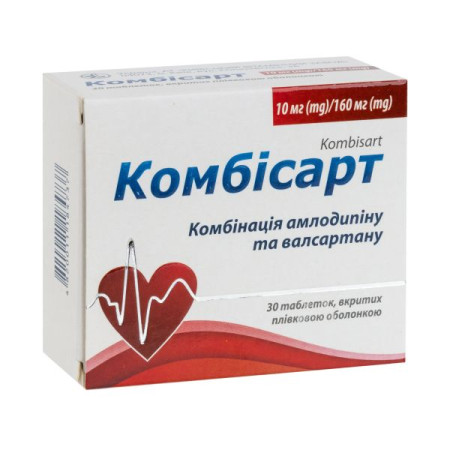Nazivin nasal drops 0.01% bottle 5 ml

Instructions for use Nazivin nasal drops 0.01% bottle 5 ml
Composition
active ingredient: oxymetazoline;
1 ml of solution contains: oxymetazoline hydrochloride 0.1 mg;
Excipients: citric acid monohydrate; sodium citrate; glycerin (85%); benzalkonium chloride solution 50%; purified water.
Dosage form
Nasal drops.
Main physicochemical properties: almost transparent, colorless to slightly yellowish solution.
Pharmacotherapeutic group
Anti-edematous and other drugs for local use in diseases of the nasal cavity. Sympathomimetics, simple drugs. ATX code R01A A05.
Pharmacological properties
Pharmacodynamics
Nazivin® belongs to the group of local vasoconstrictors. Oxymetazoline has a sympathomimetic and vasoconstrictor effect, eliminating swelling of the nasal mucosa. Narrows the vessels at the site of application, reduces swelling of the nasal mucosa and upper respiratory tract, reduces nasal discharge. Restores nasal breathing. Elimination of swelling of the nasal mucosa contributes to the restoration of aeration of the paranasal sinuses and the middle ear cavity, which prevents the development of bacterial complications.
Oxymetazoline has antiviral, anti-inflammatory, immunomodulatory and antioxidant effects. Thanks to this combined mechanism of action, clinical studies have proven a faster and more effective elimination of symptoms of acute rhinitis (nasal congestion, rhinorrhea, sneezing, malaise).
Pharmacokinetics
When using Nazivin®, nasal drops 0.01% and 0.025%, the effects of oxymetazoline appear within a few minutes after instillation.
When applied topically to the nose in therapeutic concentrations, it does not irritate the nasal mucosa or cause hyperemia. The half-life is approximately 35 hours after administration. 2.1% of the drug is excreted by the kidneys, approximately 1.1% in the feces.
The effect of the drug lasts for several hours (on average 6–8 hours), maximum – up to 12 hours.
Indication
Acute respiratory diseases accompanied by nasal congestion. Allergic rhinitis. Vasomotor rhinitis. To restore drainage and nasal breathing in diseases of the paranasal sinuses of the nasal cavity, eustachitis. To eliminate edema before diagnostic manipulations in the nasal passages.
Contraindication
Hypersensitivity to the components of the drug. Dry rhinitis.
Interaction with other medicinal products and other types of interactions
Combined use of oxymetazoline and:
tricyclic antidepressants; monoamine oxidase inhibitors such as tranylcypromine; hypertensive drugs
may cause high blood pressure. These drugs should not be combined if possible.
In case of overdose of oxymetazoline or if it is swallowed, or if used simultaneously with or immediately after tricyclic antidepressants and/or MAO inhibitors, an increase in blood pressure is possible.
Application features
In the following cases, the drug should be used only after a careful benefit-risk assessment:
increased intraocular pressure, especially in angle-closure glaucoma; severe cardiovascular diseases (e.g. coronary heart disease) and arterial hypertension; pheochromocytoma; metabolic disorders (e.g. hyperthyroidism, diabetes mellitus, porphyria); prostatic hyperplasia; when using monoamine oxidase inhibitors (MAO) and other drugs that potentially increase blood pressure;
Prolonged use, as well as exceeding the dosage, should be avoided, especially when prescribed to children. Doses exceeding the recommended ones should be used only under the supervision of a physician.
The preservative (benzalkonium chloride) contained in the drug may cause swelling of the nasal mucosa, especially with prolonged use.
Medical supervision is indicated for premature or low-birth-weight infants to avoid the risk of overdose.
Long-term use and overdose of nasal decongestants may lead to a decrease in the effectiveness of the drug and have a similar clinical picture to vasomotor rhinitis. Abuse of this drug may cause rhinitis medicamentosa, atrophy of the mucous membranes, reactive hyperemia of the nasal mucosa (reverse effect).
Ability to influence reaction speed when driving vehicles or other mechanisms
When used in recommended doses, no effect on the reaction rate when driving or operating other mechanisms is expected. After prolonged use of the drug in doses exceeding the recommended, a general effect on the cardiovascular system cannot be excluded. In such cases, the ability to drive may decrease.
Use during pregnancy or breastfeeding
Pregnancy.
During pregnancy or breastfeeding, the drug should be used with extreme caution, taking into account a balanced assessment of the benefit-risk ratio. Exceeding the recommended dosage is not recommended.
It is not known whether oxymetazoline passes into breast milk. Therefore, the use of the drug is possible only after a balanced assessment of the benefit-risk ratio. Exceeding the recommended dosage is not recommended, as it is possible to reduce the production of breast milk.
Method of administration and doses
Infants up to 4 weeks of age are prescribed 1 drop of Nazivin® 0.01% in each nasal passage 2–3 times a day.
From the 5th week of life and up to 1 year – 1–2 drops in each nasal passage 2–3 times a day.
A single dose should be used no more than 3 times a day.
The effect of the drug is achieved within a few minutes after application and lasts for several hours (on average 6–8 hours, maximum 12 hours).
Doses higher than recommended should only be used under the supervision of a physician.
Nazivin® nasal drops 0.01% should be used for no longer than 5–7 days.
Overdose
Overdose is possible after nasal or accidental internal administration. The clinical picture caused by intoxication with imidazole derivatives may be diffuse, since hyperreactive phases may alternate with phases of depression of the central nervous system, cardiovascular system and pulmonary system.
Stimulation of the central nervous system is manifested by: anxiety, agitation, hallucinations, convulsions. Suppression of the central nervous system is manifested by: decreased body temperature, lethargy, drowsiness and coma.
The following may also occur: arterial hypertension, tachycardia, bradycardia, miosis, mydriasis, convulsions, fever, cramps, sweating, pallor, lethargy, decreased body temperature, cyanosis, palpitations, arrhythmia, cardiac arrest, shock-like hypotension, nausea and vomiting, respiratory depression and apnea, psychogenic disorders.
In children, overdose often results in dominant central nervous system effects with convulsions and coma, bradycardia, apnea, and hypertension, possibly following hypotension.
Therapeutic measures: indicated in case of severe overdose. The use of activated charcoal (absorbent), sodium sulfate (laxative) or gastric lavage (if a large amount of the drug is used) should be carried out immediately, because oxymetazoline can be rapidly absorbed. Vasopressor drugs are contraindicated. Non-selective alpha-blockers can be used as an antidote. If necessary, measures for anticonvulsant therapy, ventilation of the lungs and measures that reduce fever should be initiated.
Adverse reactions
The frequency of occurrence is classified as follows: very common: ≥ 10%, common (≥1% - <10%), uncommon: (≥0.1% - <1%), rare: ≥ 0.01% - <0.1%, very rare or isolated cases: < 0.01%.
On the part of the respiratory system, chest and mediastinum.
Common: burning or dryness of the nasal mucosa, sneezing.
Uncommon: increased mucosal edema, nosebleeds after discontinuation of use.
Very rare: Apnoea in newborns and young children.
From the musculoskeletal system.
Very rare: convulsions (predominantly in children).
From the nervous system.
Very rare: restlessness, insomnia, fatigue (drowsiness, sedation), headache, hallucinations (especially in children).
From the cardiovascular system.
Rare: palpitations, tachycardia, hypertension.
Very rare: arrhythmia.
From the immune system.
Uncommon: hypersensitivity reactions (rash, itching, angioedema).
Expiration date
3 years.
After first opening the bottle, store for no more than 6 months.
Storage conditions
Store at a temperature not exceeding 25 ° C. Keep out of the reach of children!
Packaging
5 ml of solution in a vial. 1 vial in a cardboard box.
Vacation category
Without a prescription.
Producer
1. Sofarimex – Industria Quimica e Farmacêutica, S.A./Sofarimex–Indústria Química e Farmacêutica, S.A.
2. Delpharm Bladel BV/ Delpharm Bladel BV
Location of the manufacturer and its business address
1. Av. das Industrias - Alto do Colaride, Cacém, 2735-213, Portugal/Av.das Indústrias – Alto do Colaride, Cacém, 2735-213, Portugal.
2. Industrieweg 1, Bladel, 5531 AD, Netherlands.
There are no reviews for this product.
There are no reviews for this product, be the first to leave your review.
No questions about this product, be the first and ask your question.






